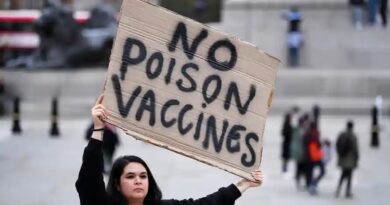Strep A deaths are not dangerous new strain caused by flu vaccines

Full Fact has identified a Facebook post which claims that the infection causing fatal strep A cases being reported didn’t used to be lethal, and implies that the deaths are linked to a new nasal flu vaccine.
The post asks “how did strep throat suddenly become so lethal to children”, but then goes on to say: “It didn’t, but they obviously needed something else to blame for the tragic deaths. After all, they are as likely to blame their new nasal ‘flu’ vaccines for childrens deaths, as they are for blaming the unproperly tested gene therapy shots for all the injuries, harm & deaths that are happening all over the World [sic].”
These claims are false—strep A has been known to be lethal for as long as we have known about the bacteria, and there is no evidence that vaccine rollout has led to the deaths seen in late 2022.
What is strep A?
Strep A, also known as GAS or group A streptococcus, is a bacteria sometimes found in the throat or on the skin, often carried harmlessly. It usually causes mild illnesses such as a sore throat. In some cases it can cause scarlet fever, which is again usually mild.
More serious and even life-threatening infections can occur when the bacteria enters deeper into the body, such as in the lungs or the bloodstream—these are termed invasive group A strep (iGAS) infections
At the time of writing, there have sadly been 25 confirmed deaths in children under the age of 18 in England since September 2022.
Strep A has always been dangerous
The post seems to imply that because Strepsils (a brand of over the counter throat lozenges to soothe sore throats) seem to be named after streptococcal bacteria, the bacteria must usually be mild.
But this is not the first time we have seen deaths from strep A infections.
While we have seen an increased number of strep A cases and deaths in children than usual for this time of year, at the moment this appears to be an earlier peak than usual rather than one causing an unprecedented number of deaths. From September 2017 to September 2018 for example, the last high season for strep A infections, 27 children died in England.
The UK Health Security Agency (UKHSA) states: “While high for this point in the season, the weekly laboratory notifications [for iGAS cases] are lower than the weekly totals seen during the normal pre-pandemic peak season (March to April)”.
The case fatality rate (the proportion of people with an iGAS infection who die from it) within seven days is also comparable to previous seasons.
Furthermore, there is no new antibiotic resistance to penicillin and the resistance rates to other antibiotics are lower than in previous years. The UKHSA says: “Currently, there is no evidence that a new strain of GAS is circulating or any increase in antibiotic resistance”
Streptococcal bacteria in general were first identified and described in the 1870s, with group A strep not far behind. Scarlet fever as a distinct disease has been recognised since the 1600s.
Clearly, data on causes of deaths is more readily available now than it was in the past, but the data we do have paints a bleak picture of the world before penicillin. For example, historic data from the US state of Massachusetts shows a peak mortality rate from the disease of 173 per 100,000 people was reached in 1857.
For context, given a population of 67 million, this death rate would mean over 115,000 deaths in the UK in a year. In 2017/18, during the last comparable strep A season, the total death toll for all ages was 355.
The nasal flu vaccine is not new, does not cause strep A, and is not dangerous
The post also refers to “new nasal ‘flu’ vaccines” and appears to suggest they may be the real cause of the deaths in children this year from strep A. But these vaccines are not new, and there is no evidence they are causing strep A infections or deaths.
The nasal flu vaccine has been given to schoolchildren in the UK for nine years, starting with earlier ages in 2013 and gradually rolled out to older school children. Over the 2021/22 flu season, all children from age two up to those in year 11 were offered the flu vaccine, with this year’s rollout concentrated in children up to year 9, though children in year 10 and year 11 may be vaccinated if there is leftover product.
We have fact-checked several claims regarding the nasal flu vaccine causing strep A. There is no evidence that this is the case, and in fact, a recent UKHSA pre-print article showed there were fewer strep A infections in areas where more children received the nasal flu vaccine, and no difference in scarlet fever or iGAS numbers.
The Medicines and Healthcare products Regulatory Agency (MHRA) previously told Full Fact: “Millions of children and adolescents have received this vaccine as part of the national flu immunisation programme and an increased risk of Strep A infections has not been identified as a safety concern.
“The MHRA closely monitors the safety of all vaccines used in the UK, including [the nasal flu vaccine] and the MHRA’s position remains that the benefits associated with this vaccine continue to outweigh any risks.”
Covid vaccines
The post also seems to make a similar claim about Covid-19 vaccines being harmful, calling them “unproperly tested gene therapy shots” that are to blame “for all the injuries, harm & deaths that are happening all over the World”.
We have fact checked similar claims about the covid vaccines before: they are not “gene therapy”, nor are they responsible for “‘Sudden Adult Death Syndrome’” as referenced in the post.
Colonisation study repeatedly misrepresented
While the poster has made the above claims in the caption of the post, they have also included a screenshot of the title of a study in mBio, which looked at how giving mice the nasal flu vaccine affected the bacteria found in their airways. The post’s caption doesn’t explicitly refer to this. We have covered this study before in relation to claims that the nasal flu vaccine causes strep A infections, and it is frequently being used to support such claims on social media.
The study monitored two different types of bacteria, and not strep A. The authors found increased numbers of these bacteria in the upper respiratory tracts of the mice, but did not find any evidence of an increased risk of severe infection or death resulting from this. We have written in some detail about this study previously, but the takeaway is that this study does not support the claims of this post—it does not show that the nasal flu vaccine causes strep A infection in humans.
Image courtesy of Authentic Images


